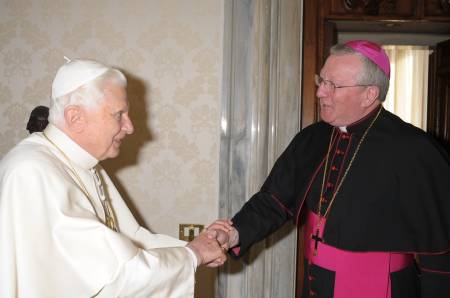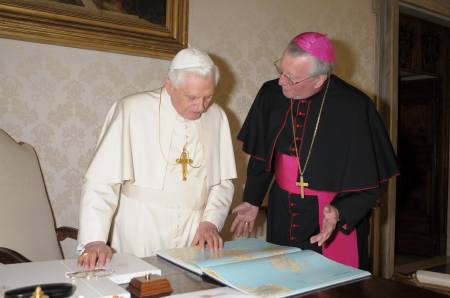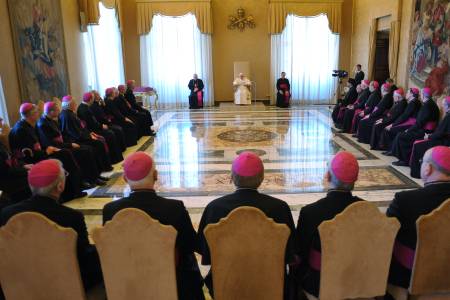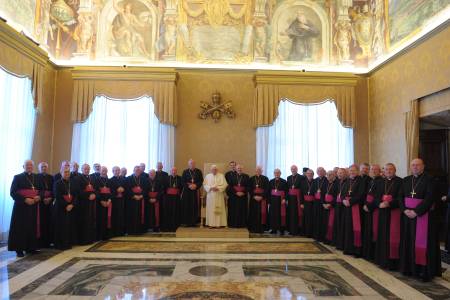The Visit of the Bishops of England and Wales to the Threshold (Ad Limina) of the Apostles, 25th January – 4th February 2010
We were all called to Rome – all 35 of us, four archbishops, 18 diocesan bishops, ten auxiliary bishops, including one retired, the Apostolic Administrator of the Ukrainian Church in Great Britain, the Apostolic Prefect of the Falkland Islands and one coadjutor bishop-elect – to the ‘threshold of the Apostles’. We were on pilgrimage to the tombs of Peter and Paul to renew our communion with the See of Peter, with his successor, Pope Benedict XVI and to have our faith confirmed.
I did not know what to expect, so I approached the visit with a certain amount of trepidation and awe. It was with an air of unreality that I entered the Apostolic Palace and, after being saluted by a series of Swiss Guards, I was ushered into the marble hall of the Papal Household. While waiting to go into Holy Father’s office, a real papal chamberlain instructed me on what I had to do.

The moment came and doors opened for me. As soon as I came into the Holy Father’s presence, his warm smile and gentle manner put me completely at ease. So much so that I could not stop talking or waving my arms about. He wanted to know all about the diocese, its geographical position and extent. He asked about the problems that we were facing, the state of our faith, he wanted me to talk about our young people, the schools of the diocese. He asked after our priests and religious, wanting to know the numbers of active and retired and he inquired about the number of vocations we had to priesthood and religious life.

If I thought that he might not really know where I came from, he suddenly began to mention various places and institutions in the diocese. Before I left I was able to pass on to him the loyal greetings of all the diocese and he asked me to pass on his blessing and assure each and every one of the promise of a place in his prayers.

On the Monday morning, 1st February, all the bishops met with the Holy Father in a formal audience. Archbishop Nichols thanked the Pope for receiving us and passed on to him the best wishes and loyal support of the Catholic people of England and Wales. After this the Holy Father gave a perceptive and pertinent reflection to us. These are some of the main points.
- There are many signs of living faith and devotion among the Catholics of England and Wales, not least the enthusiasm generated by the visit of the relics of St Thérèse, the interest aroused by the prospect of Cardinal Newman’s beatification, and the eagerness of young people to take part in pilgrimages and World Youth Days.
- On the occasion of my forthcoming Apostolic Visit to Great Britain, I shall be able to witness that faith for myself. During the months of preparation that lie ahead, be sure to encourage the Catholics of England and Wales in their devotion, and assure them that the Pope constantly remembers them in his prayers and holds them in his heart.
- The Equality Bill has imposed unjust limitations on the freedom of religious communities to act in accordance with their beliefs. I urge you as Pastors to ensure that the Church’s moral teaching be always presented in its entirety and convincingly defended.
- If the message of Christ is to be presented effectively and convincingly to the world, the Catholic community in your country needs to speak with a united voice – the Bishops, but also priests, teachers, catechists, writers, in short all who are engaged in the task of communicating the Gospel are to be attentive to the promptings of the Spirit, who guides the whole Church into the truth, gathers her into unity and inspires her with missionary zeal.
- Make it your concern, then, to draw on the considerable gifts of the lay faithful in England and Wales and see that they are equipped to hand on the faith to new generations.
- It is important to recognise dissent for what it is, and not to mistake it for a mature contribution to a balanced and wide-ranging debate. It is the truth revealed through Scripture and Tradition and articulated by the Church’s Magisterium that sets us free.
- In this Annus Sacerdotalis (Year of Priests), I urge you to hold up to your priests his (Newman’s) example of dedication to prayer, pastoral sensitivity towards the needs of his flock, and passion for preaching the Gospel. You yourselves should set a similar example. Be close to your priests, and rekindle their sense of the enormous privilege and joy of standing among the people of God as alter Christus.
- Encourage the lay faithful to express their appreciation of the priests who serve them, and to recognise the difficulties they sometimes face on account of their declining numbers and increasing pressures. The support and understanding of the faithful is particularly necessary when parishes have to be merged or Mass times adjusted. Help them to avoid any temptation to view the clergy as mere functionaries but rather to rejoice in the gift of priestly ministry, a gift that can never be taken for granted.
- Ecumenical and inter-religious dialogue assume great importance in England and Wales. Be generous in assisting those groups of Anglicans who wish to enter into full communion with the Catholic Church.
- To all of you, and to the priests, religious and lay faithful of your country, I cordially impart my Apostolic Blessing as a pledge of peace and joy in the Lord Jesus Christ.

If you wish to read the text in full, you can find it at:
http://www.vatican.va/holy_father/benedict_xvi/speeches/2010/february/documents/hf_ben-xvi_spe_20100201_bishops-england-wales_en.html
For me personally it has been a very positive and strengthening experience. If I were to sum up the Ad Limina, visiting the various Offices of the Vatican and the meetings with the Holy Father, two words spring immediately into mind – encouragement and support. For all the blessings and graces received as a result of this visit to the threshold of the Apostles, I give heartfelt thanks.
Terence Patrick Drainey, Bishop of Middlesbrough
